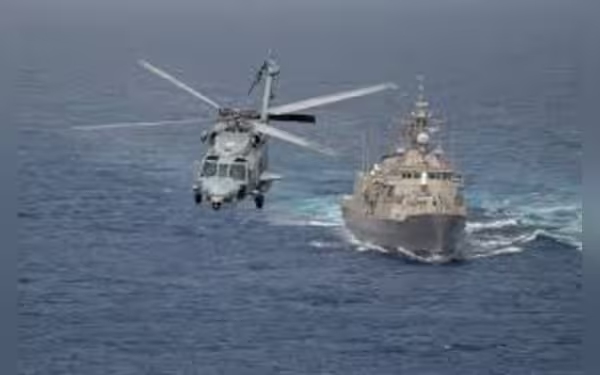Saturday, November 16, 2024 08:52 PM
New Salvage Efforts for Sounion Oil Tanker After Houthi Attack
- Houthi rebels attack Greek oil tanker Sounion in Red Sea.
- EU launches salvage operation to prevent environmental disaster.
- Over 80 vessels targeted by Houthis since Gaza conflict escalation.
 Image Credits: thefrontierpost
Image Credits: thefrontierpostSalvage efforts for the Sounion oil tanker intensify after Houthi rebels' attack raises environmental concerns in the Red Sea.
The ongoing conflict in Yemen has led to a series of alarming incidents in the Red Sea, particularly involving oil tankers. Recently, the Greek-flagged oil tanker, Sounion, became a focal point of concern after it was attacked by Yemen's Houthi rebels. This incident has raised significant fears regarding the potential environmental disaster that could arise from the tanker, which is carrying approximately 1 million barrels of crude oil.
On August 21, the Sounion was targeted by the Houthis, who have been increasingly aggressive in their operations since the escalation of the war in Gaza. The vessel was manned by a crew of 25 individuals, primarily from the Philippines and Russia, along with four private security personnel. Following the attack, a French destroyer successfully evacuated the crew to Djibouti, ensuring their safety amidst the chaos.
In a troubling turn of events, the Houthis planted explosives on the Sounion and detonated them, leading to fears of a catastrophic oil spill in the Red Sea. The European Union's Operation Aspides has stepped in to address this crisis, launching a new attempt to salvage the burning tanker. The EU has been actively involved in creating a secure environment for tugboats to conduct towing operations, as they escort vessels towards the Sounion.
Since the onset of the conflict in Gaza, the Houthis have targeted over 80 vessels using missiles and drones. Their campaign has resulted in the seizure of one ship and the sinking of two others, tragically claiming the lives of four sailors. The rebels assert that their attacks are aimed at vessels linked to Israel, the United States, or the United Kingdom, as part of their strategy to pressure these nations to halt their support for Israel's actions against Hamas.
However, it is important to note that many of the ships attacked have little to no connection to the ongoing conflict, including those bound for Iran. This raises questions about the broader implications of such aggressive tactics and the potential for unintended consequences in international waters.
As the situation unfolds, the international community watches closely, aware that the stakes are high. The potential for an oil spill poses a significant threat not only to marine life but also to the livelihoods of those who depend on the Red Sea for fishing and trade. The efforts to salvage the Sounion are crucial, and the outcome will likely influence future maritime security strategies in the region.
The incident involving the Sounion serves as a stark reminder of the complexities and dangers of maritime operations in conflict zones. It highlights the urgent need for diplomatic solutions to prevent further escalation and protect vital marine ecosystems. As we continue to monitor this situation, it is essential to advocate for peaceful resolutions that prioritize both human safety and environmental preservation.













